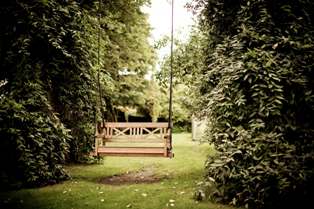By Mike Playdon
 It was, I think, my first ever Quiet Day, some 20 years ago it must have been. The format was one I’ve come to see as being fairly typical, with some input from a speaker followed by times of silence, and worship to top and tail. I certainly don’t remember the topic of the day. I recall, however, that we were invited to ponder a Scripture passage during the ensuing silence. This was not something I was very used to, but along with others I walked the lanes and paths in the vicinity of the priory where we were meeting and tried to do just that. I found my thoughts jumping around all over the place. I kept telling myself that I needed to get back to the Scripture passage, but succeeded only in feeling that I just couldn’t hack it. I just couldn’t do what I thought I was supposed to be doing. I then walked round a corner in the grounds and saw one of the group sitting on a swing, just swinging back and forth. He later told me that he made a point of doing that every time he visited the priory. The penny dropped. I didn’t have to worry about getting the meditation right. I simply needed to relax, let go, just to be...
It was, I think, my first ever Quiet Day, some 20 years ago it must have been. The format was one I’ve come to see as being fairly typical, with some input from a speaker followed by times of silence, and worship to top and tail. I certainly don’t remember the topic of the day. I recall, however, that we were invited to ponder a Scripture passage during the ensuing silence. This was not something I was very used to, but along with others I walked the lanes and paths in the vicinity of the priory where we were meeting and tried to do just that. I found my thoughts jumping around all over the place. I kept telling myself that I needed to get back to the Scripture passage, but succeeded only in feeling that I just couldn’t hack it. I just couldn’t do what I thought I was supposed to be doing. I then walked round a corner in the grounds and saw one of the group sitting on a swing, just swinging back and forth. He later told me that he made a point of doing that every time he visited the priory. The penny dropped. I didn’t have to worry about getting the meditation right. I simply needed to relax, let go, just to be...
Some years later, spending a sabbatical studying the life, writings and spirituality of St Francis of Assisi, I came across a book by Brother Bernard, entitled Open to God: The Franciscan Life (Fount, 1986). In his chapter on Obeying, he writes:
‘A friend of mine, who is a sculptress, had a phase of making beautiful, sensuous figures and suspending them in metal frames so that they swung. She had discovered a framework for her own life — the re-discovery of her Christian faith and the value of form and rule in worship and personal discipline. The acceptance of limits can be a freeing thing: within them we can swing.’
That seemed to fit in with my main discovery, during that first quiet day, namely the importance of letting go, of finding freedom to be, and of locating it within some kind of framework.
If silence is to be part of our Christian life, we must use it creatively, and that means we are to put aside any idea that somehow silence has to be ‘useful’. We are to hand it over to God, wait for God to lead, to speak, to put ideas, thoughts and prayers into our minds. It is here that the psalmist’s urging, ‘be still, and know that I am God’ (Psalm 46:10) is so important. The words, ‘Be still’ have been translated in a variety of ways, including ‘Pause a while, ‘Stand silent’ , Stop fighting and, simply, ‘Stop’. I particularly like, “Let be....
I commend the comments of Kenneth Slack (New Light on Old Songs, SCM, 1975):
‘It does not mean ‘Meditate on God’, but it does mean among other things, ‘Let go, let go of your scurrying around and frantic activity, and your panic and your vulnerability that makes you so easily dominated by all that is noisy and outwardly impressive, and just see me at work…’ Rest, shelter if you like, in the thought of the quiet operation of God, whose river produces no noisy crash of billows but steadily flows to cleanse, irrigate and quicken human life.’
We are to stop, let go, let be, and swing.




